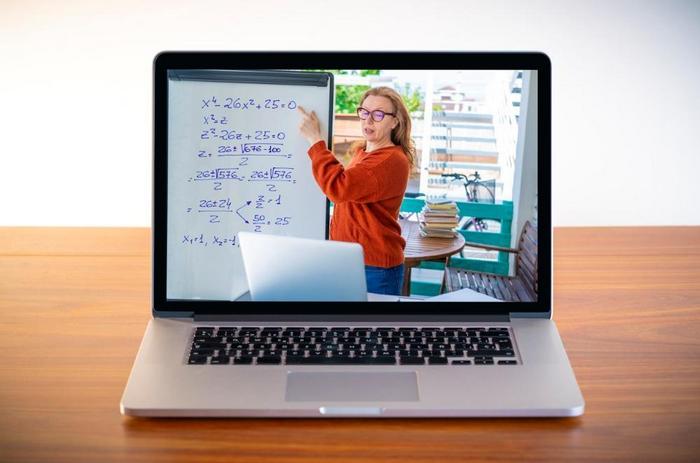Thanks to online learning opportunities, higher education is becoming more accessible to students of all backgrounds and interests. Completing remote degree programs is an exceptional way for students to not only invest in their future, but also to build some of the skills they will find most important in their professional journey. This article will explore the benefits of higher education, and remote higher education in particular.

Benefits of higher education
Whether a student is simply hoping to expand their work opportunities as an experienced professional or is just finishing high school and debating college, there are a few reasons to consider an advanced education degree. Three of the most important of these include:
- Better income.
- Enhanced employability.
- Education tailored to a specific career.
This section provides a brief overview of the above to help students best understand the pros of university degrees.
Better income
According to the Social Security Administration, college graduates in the US show substantially higher lifetime earnings than their colleagues without post-secondary education. More specifically, women with bachelor’s degrees have been shown to earn roughly $600,000 more than individuals without college degrees and men earn even more than that at roughly $900,000. This gap increases further when graduate degrees are involved. Women with at least one graduate degree earn over $1 million more than their non-degreed counterparts, while men earn roughly $1.5 million more.

Enhanced employability
According to a 2022 report from the National Center for Education Statistics (NCES), college graduates enjoy enhanced employability compared to their counterparts with no higher education. This means that people with college degrees had better employment prospects as well as a higher degree of desirability by employers. This is increasingly important in today’s economy, where the need to stand out in a pool of global candidates is crucial. From 2010 to 2021, the employment rate for individuals with a bachelor’s degree or higher increased by 2% to 86%, showing that the need for a college degree is only rising as time passes.
Education tailored to a specific career
Higher education allows students to receive training and qualifications tailored to their professional goals. When it comes to counseling work involving children and young adults, for example, an interested individual could complete a program designed for aspiring school counselors. As this career pathway requires rigorous instruction across specific areas, it is best to find a school that offers accredited programs, like the online Master’s School Counseling degree at St. Bonaventure University. The coursework is flexible, designed for online learners and comes with placement support. The takeaway is that higher education matters where well-trained (and extremely hirable) professionals are concerned.
Adaptability
One of the biggest benefits remote learning has to offer is its opportunity to build adaptability. This is a bit different from “flexibility”, the term with which it is frequently used interchangeably. Adaptability is a skill that allows individuals to look ahead, consider potential pitfalls or complications that might arise regarding a particular task, and plan contingencies. Flexibility, on the other hand, is more about changing plans in the moment and rebounding from unexpected disruptions. Both are important to remote learning, but adaptability is crucial for successful online students.

When attending school in person as a traditional student, their schedule is typically concrete. They have classes at specific times and spend the rest of their time studying. The entirety of the term tends to follow the same way. Maybe students add a few days a week working part-time, maybe not, but the foundation of their schedule is set by the school and remains rigid. Remote learning, however, doesn’t offer the same concrete schedule. In fact, one of its selling points is that students can fit online courses around their existing routine. While the true extent of this depends on the school and degree in question, it is not unusual for students to work full-time and study wherever they can find the time.
Professionals with an established career might not be able to study from nine to five, for example, but they might be able to study at night or even on their lunch breaks. Parents returning to school might have a bit more time to study during the day, depending on their work situation, but comparatively less time in the mornings and evenings. They can, however, sometimes fit some study time into their schedule when picking up their children from school or putting their youngest down for naps.
Online classes are ideal for all sorts of students, whether they are just graduating high school or are returning to school later in life. As long as they can proactively fit studying into their schedule and account for potential disruptions, it can be a great option. With that said, remote learning teaches adaptability over time – it is not an instantaneous shift.
Building adaptability
Online learning requires students to adjust their resource utilization, goal setting, attitudes, behaviors, and learning strategies as needed to adapt to new learning requirements and conditions. Some of the areas where students build the most adaptability include information literacy, self-management skills, and technical proficiency, all of which will prove useful in professional careers. With each area that students master, their adaptability increases greatly.
Information literacy refers to the ability to communicate, use, organize, evaluate, and find information in a variety of formats. Students are often required to prepare research papers, for example, which entail quite a bit of work. To succeed, students must discover potential sources and discern which are credible or not. This is especially important to master for remote students because remote learning professors might not always have the time or the means to coach students one-on-one for every potential source they find. Students must be self-sufficient and verify the veracity of their sources on their own. Once they develop information literacy, they will find it easier to locate information even in very disparate circumstances.

Self-management skills are equally important to remote learning. When attending school in person, the rigid structure helps keep students on track. Their entire world is crafted around their school schedule at that point, and it is natural to adopt studying habits that complement time spent in class. Remote learning, on the other hand, does not typically offer students the same rigidity in scheduling. This is excellent when it comes to maintaining a healthy work-life balance that allows students to study on their own time and at their own pace, but it also comes with drawbacks.
Students in online learning programs must be able to manage themselves. They don’t have a teacher looking over their shoulder during remote learning. The most successful students are those who take an active approach to their scheduling and studying. This involves making time for their studies along with all the other responsibilities in their lives and sticking to the schedule even when things get complicated. Mastering self-management skills is a huge step to mastering adaptability.
Finally, technical proficiency is required for true adaptability during higher education and beyond. This refers to a student’s ability to apply technical knowledge in various situations to achieve expected outcomes. Technically proficient people communicate professionally and effectively using technology while also using tech to organize information, enhance thinking skills, and produce high-quality results. Even in the most unusual circumstances, technically proficient individuals understand how to use the tools available to them to complete their work, even when the technology in question is unfamiliar.
Time management
Another important skill taught by remote learning is time management. This refers to a student’s ability to manage not just themselves but also the amount of time available to complete certain tasks. Creating a study schedule that looks good on paper will be useless if the student cannot manage their time efficiently and end up working longer than needed in each area. Students can consider time management to go hand in hand with self-management skills. Both help students manage themselves effectively to enhance their chances of success in remote learning and beyond.
Time management is something that some students (and professionals) struggle to master, but there are plenty of tips to help demystify the process.
Building time management skills

The first step to excellent time management is creating an effective schedule. Students should consider all their daily responsibilities. Which of them take priority, and which can be shifted to find more time in the day? The student’s goal is to balance studies with the rest of their life, so they don’t burn out in one area or another. They must be realistic with this schedule too. For example, if they want to finish dinner in an hour but know that it always takes closer to an hour and a half, they must account for an hour and a half in their schedule.
Once all responsibilities are laid out and organized, the next step is to find the time in the day to complete everything that needs to be done. Chances are good that students will find a time deficit rather than a surplus at this point, which is where time management skills kick in. Where can they seek out just a few more minutes? If they have 10 tasks to complete in addition to studying during the day and they manage to take 10 minutes of time from each, for example, they now have 100 additional minutes for study. Students will likely need to be ruthless here but should also remember to be realistic with time cuts and leave some time to breathe.
Another area where students can manage their time effectively is breaks. They should take breaks as they need to, but that doesn’t mean students have to cut themselves off from the rest of their lives completely. If they take an hour for lunch each day, they could consider listening to a lecture or reading while eating. This is a good way for students to add a few more minutes of work to the day without making it an undue burden on other responsibilities. Students must make sure that when they include studying on a lunch break in their schedule, they also include specific tasks to accomplish.
Realistically, will they finish listening to a lecture or complete a paper while eating? Students should note down those goals in their schedule. Setting achievable goals is an important part of time management, and the most effective students can break their time into a series of smaller steps to reach them. If the goal is to finish a research paper by the end of the day, for example, they can adapt the rest of their schedule to suit that goal. Students may be surprised by how much more they can get done when setting goals in this way.
Effective communication
Effective communication is one of the most important skills anyone can master in their personal and professional/academic lives alike. It refers to the process of exchanging knowledge, opinions, ideas, data, and thoughts with other people. This is especially important to students as they progress through their degrees and take on more responsibility as their knowledge grows.
Remote learning students must develop impeccable communication skills to connect with their classmates and professors. When there is only a small amount of time to interact with the other people in a class, students must make that time count. This enhances verbal communication skills as students learn to be concise and straightforward. Written communication is also crucial to success in these circumstances.
Building effective communication skills

Building effective communication skills doesn’t have to be difficult. As long as students think about what they are saying before they speak or write, they can learn to adapt their words to suit the situation and recipient in question. To do this, individuals simply ask themselves a few questions before they begin communicating:
- To whom are they communicating?
- What role does this person play in their life/studies/career?
- What information do they have for this person and why do they need it?
- Are they communicating respectfully and clearly?
Once an individual can answer ‘yes’ to all the above, they are ready to begin communicating. Note here that communication isn’t a one-time thing, and students must be able to keep the questions in mind even in long or meandering conversations. The process might be tedious but remaining engaged in the interaction and paying attention to how their communications are received can speed up the skill acquisition significantly.
For example, a data analyst professional interprets large amounts of raw data and then transmits those findings to other professionals in the company. Sometimes this requires finesse and forethought as the people in question might not have the knowledge, background, or vernacular that data analysts use to interpret data. It is up to the data analyst to effectively communicate the information to the larger group.
Most professions have similar circumstances. A school counselor, for example, is tasked with teaching tools to their students. Teaching coping skills requires professionals to connect with students on their level and communicate in a way they can understand. Regardless of the profession in question, effective communication matters in professional circumstances.

Online learning for all
For those interested in learning more about online education and how it can build skills for success later in life, the information gathered above will be crucial. They can consider this article a starting point to explore field-specific program options for the careers they are interested in. With the right skills, anyone can thrive.











